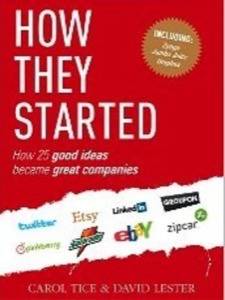Successful entrepreneurs are really smart. Just look at Bill Gates or Mark Zuckerberg, guys who could get a lobotomy and still do your math homework. But intelligence is not the defining characteristic of successful entrepreneurship. Instead, the secret is a more prosaic quality: good old-fashioned stick-to-itiveness.
That’s the conclusion reached by Carol Tice, author of How They Started: How 25 Good Ideas Became Great Companies. Tice says entrepreneurs are different from other folks.
Not Fazed by Failure
“When a normal person starts a business and it fails, they go get a job,” she explains. “Whereas an entrepreneur says, ‘That was interesting, and I learned a lot of great stuff.’ Failure doesn’t faze them. They figure out what they did wrong and what to do right the next time.”
Successful startup founders are also able to figure out what they’re doing wrong while they’re doing it – and start doing something else fast.
Take, Twitter, for example. It began as a podcasting platform called Odeo. But when Apple launched iTunes, CEO Evan Williams saw immediately that Odeo was DOA, so he told his 13 employees to start thinking of other ideas. A guy named Jack Dorsey developed a status-updating app called Twttr – and the rest is #history.
“Great entrepreneurs think on the fly and shift on a dime,” says Tice, whose book includes case studies of tech companies including eBay, LinkedIn and Zynga, along with nontech businesses such as Chipotle, Whole Foods and Spanx. “Quite often the big thing is not the thing they set out to do originally. But they have the brilliance to recognize the big thing when it does come along.”

Confident, Brash and Cocky
To do that – abandon an idea on which you’ve hung your hopes, your dreams and your credit card balance – takes chutzpah. And this is another quality Tice noted in the people she covers in her book. “There’s a brashness and cockiness to all these entrepreneurs, even when they’re nobodies and their companies are nothing.”
Trip Hawkins, the guy behind Electronic Arts – which now employs 7,600 people and made $677 million profit in 2010 – started out by reverse engineering games on the Sega platform, even though he had no permission to do so and quickly attracted the attention of Sega’s legal team. “But he played a game of brinksmanship and said, ‘I’ll do this with or without you, so why don’t you cut me an awesome deal?’ And they did,” Tice says.
You need that kind of confidence to deliver on perhaps the most important characteristic of successful entrepreneurs: a willingness to devote everything they have to their ideas.
“There’s a work ethic to all these great companies that’s just incredible,” Tice marvels. “They push the limits of what humans are capable of. Everybody has read The Four-Hour Workweek and they think they can press a button and make bazillions. But the part Tim Ferris left out is that you work your tail off for two or three years nonstop around the clock, you have no life, your wife divorces you, your friends leave you and then, if you’re really lucky, the thing you’re working on actually works. And then the money pours in.”

















